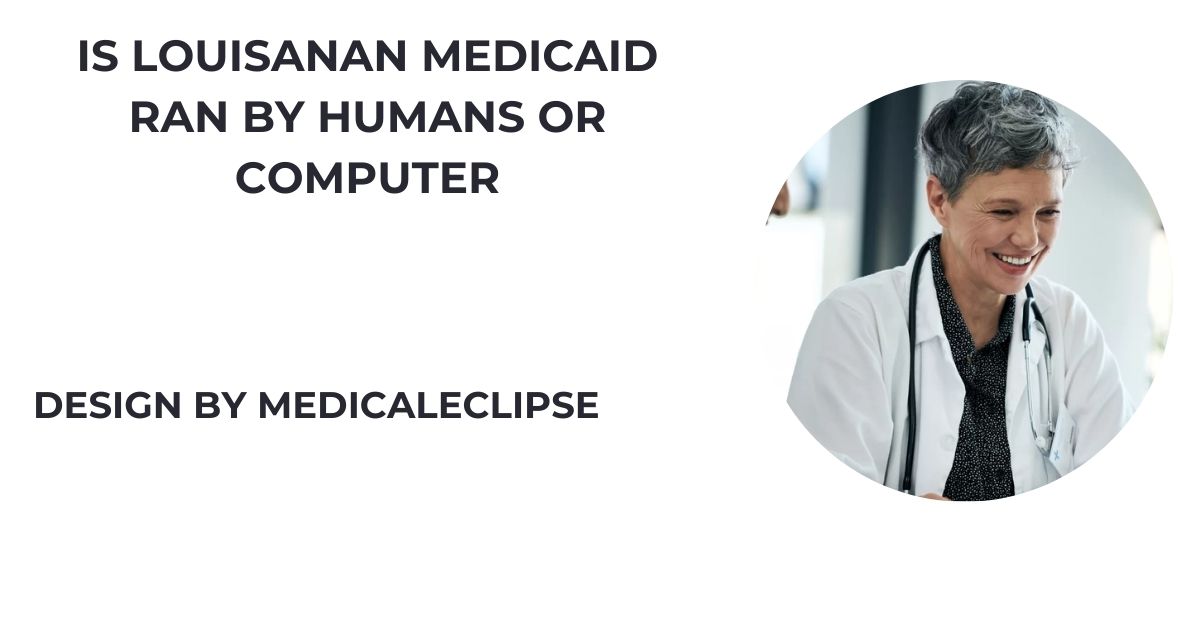Louisiana Medicaid uses a hybrid model, combining human oversight and computer automation to ensure efficient service delivery.
In this article, we will explore the roles humans and technology play in managing Louisiana Medicaid, shedding light on their collaborative efforts to deliver efficient and reliable services.
The Role of Humans in Louisiana Medicaid:

Human oversight and decision-making are essential components of the Louisiana Medicaid program. Humans are involved in:
Policy Creation and Oversight:
State officials and healthcare administrators develop and regularly update policies to ensure Medicaid complies with federal guidelines and addresses the specific needs of Louisiana residents. They also evaluate the program’s performance and make strategic decisions to improve services.
This process involves collaboration with experts and stakeholders to ensure inclusivity. Policies are often revised based on emerging healthcare trends and community feedback. Additionally, these updates help address disparities and improve overall access to care.
Case Management:
Trained caseworkers play a critical role in reviewing applications, verifying eligibility, and addressing complex cases. They provide personalized support to applicants, ensuring individuals understand their benefits, resolve disputes, and access the resources they need. Caseworkers also conduct follow-ups to ensure beneficiaries receive timely care. They help applicants navigate changes in eligibility due to life events, such as job loss or family changes. Furthermore, they coordinate with healthcare providers to ensure a seamless experience for beneficiaries.
Customer Service:
Medicaid representatives are available to handle inquiries from beneficiaries and providers. They assist with navigating the application process, troubleshooting issues, and answering questions about coverage and claims. Representatives are trained to address common concerns while providing empathetic support.
They also help resolve urgent issues, such as claim denials or lapses in coverage. Moreover, their insights often inform program improvements by highlighting recurring user challenges.
Healthcare Provider Management:
Human administrators oversee contracts with healthcare providers, ensuring they adhere to Medicaid regulations and deliver quality care to patients. This includes negotiating payment rates, monitoring performance, and resolving disputes.
Administrators also work to expand provider networks to improve access. They conduct regular audits to ensure compliance with service standards. Additionally, they foster partnerships with providers to introduce innovative care solutions.
Fraud Investigation:
While computers flag potential fraud, human investigators examine flagged cases in detail, collecting evidence and determining the validity of claims. Investigators interview involved parties and review documentation to build robust cases. They collaborate with law enforcement and legal teams to pursue fraudulent activities. Their work also includes developing preventive strategies to minimize future occurrences.
Community Engagement:
Human professionals engage with local communities to educate residents about Medicaid services, eligibility criteria, and application procedures. They also gather feedback to improve the program. These efforts include hosting workshops and informational sessions to raise awareness.
Community engagement teams collaborate with local organizations to reach underserved populations. Additionally, they work on creating culturally sensitive materials to ensure inclusivity.
Also Read: Sky Ridge Medical Center – Advanced Care, Exceptional Service”!
The Role of Computers in Louisiana Medicaid:
Technology plays a significant role in streamlining and automating various processes within Louisiana Medicaid, making the system more efficient and accessible. Key areas where computers are utilized include:
- Application Processing: Online portals and automated systems process applications quickly, reducing wait times and minimizing errors. These systems often include user-friendly interfaces that guide applicants through the process.
- Eligibility Verification: Automated systems conduct real-time data checks against state and federal databases to verify income, residency, citizenship, and other eligibility criteria. This ensures accuracy and reduces the risk of fraud.
- Claims Management: Healthcare providers submit claims electronically, which are processed by automated systems. These systems verify the claims against Medicaid guidelines and approve or deny them based on predefined rules, ensuring timely reimbursements.
- Data Analysis and Reporting: Advanced analytics tools process vast amounts of data to identify trends, improve resource allocation, and enhance program efficiency. These tools also detect potential fraud and abuse by analyzing unusual patterns.
- Communication Tools: Automated messaging systems send reminders about renewal deadlines, appointment notifications, and other important updates to beneficiaries.
- Security and Compliance: Computers manage encryption, secure data storage, and compliance with federal and state regulations, ensuring beneficiary information remains confidential.
A Hybrid Approach: Humans and Computers Working Together:

Louisiana Medicaid employs a hybrid model, where humans and computers collaborate to deliver efficient and reliable services. While computers handle repetitive, data-intensive tasks, humans intervene for activities requiring judgment, empathy, and nuanced decision-making.
For example:
- Application Assistance: Online systems can flag incomplete applications, but human caseworkers guide applicants through resolving issues.
- Fraud Detection and Prevention: Automated systems identify anomalies in claims or eligibility data, but human investigators analyze flagged cases to confirm or dismiss suspicions.
- Quality Assurance: Computers monitor provider performance metrics, but human administrators conduct on-site evaluations and address specific concerns raised by patients or providers.
Benefits of the Hybrid Approach:
The integration of human expertise and computer efficiency ensures:
Speed:
Automated processes reduce wait times for applications and claims. These systems can process high volumes of requests simultaneously, avoiding backlogs. Additionally, they streamline approvals for straightforward cases, freeing up human resources for complex situations. As a result, beneficiaries experience faster access to their healthcare benefits.
Accuracy:
Data verification systems minimize errors in eligibility determinations and claims processing. Automated checks ensure information matches official records, reducing discrepancies. They also help flag inconsistencies that might indicate fraud or errors. This leads to more precise outcomes and fewer disputes requiring manual intervention.
Personalization:
Human representatives provide tailored support, addressing unique needs and circumstances. They take the time to understand individual cases, offering empathy and expertise. By considering personal details and preferences, they ensure beneficiaries feel heard. This approach fosters trust and satisfaction among Medicaid users.
Also Read: Concentra Medical Center – Keeping Your Workforce Safe and Healthy!
Accountability:
Human oversight ensures the program operates fairly and transparently. Regular audits and reviews by human administrators maintain high standards. They address complaints and resolve disputes impartially, upholding trust in the system. This accountability also enhances public confidence in Medicaid’s operations.
Scalability:
Automated systems handle increasing volumes of applications and claims as the program grows. They can adapt to surges in demand during enrollment periods or emergencies. This scalability ensures continuity of services without overwhelming human staff. As a result, Medicaid remains accessible to a larger population efficiently.
Why This Matters for Medicaid Users?
Understanding this hybrid system can help users know where to turn for support. For example:
- Technical Issues: If you encounter problems with the online application portal, human customer service representatives are available to assist.
- Eligibility Questions: If your application is flagged or denied, a caseworker can explain the decision and help you provide the necessary documentation.
- Provider Concerns: If you experience issues with a healthcare provider, Medicaid administrators can intervene to address the problem.
Challenges and Opportunities:
While the hybrid system offers many benefits, it also presents challenges:
- System Complexity: The combination of human and technological processes can sometimes lead to communication gaps or misunderstandings.
- Digital Access: Not all beneficiaries have reliable internet access or are comfortable using online tools, necessitating robust offline support options.
- Resource Allocation: Balancing the workload between humans and computers requires careful planning and continuous evaluation.
Opportunities for improvement include expanding digital literacy programs, enhancing the user-friendliness of online portals, and increasing funding for caseworker support to reduce workloads and improve service quality.
FAQ’s
1. Is Louisiana Medicaid managed solely by computers?
No, Louisiana Medicaid operates using a hybrid model where humans and computers collaborate to provide efficient and personalized services.
2. What roles do humans play in Louisiana Medicaid?
Humans handle policy creation, case management, customer service, provider management, fraud investigations, and community engagement.
3. What functions are automated in Louisiana Medicaid?
Computers handle application processing, eligibility verification, claims management, data analysis, communication, and security compliance.
4. Why does Louisiana Medicaid use both humans and computers?
The hybrid approach ensures efficiency, accuracy, personalized support, and scalability while maintaining accountability through human oversight.
5. How does this system benefit Medicaid users?
Users benefit from faster processes, fewer errors, empathetic human support, and seamless access to services through both digital and human channels.
Conclusion
Louisiana Medicaid combines computer efficiency with human expertise to provide seamless services. This hybrid approach ensures accuracy, accountability, and personalized support for beneficiaries. Whether applying for benefits, managing healthcare, or resolving claims, both humans and technology play crucial roles. Understanding their collaboration helps users navigate the system effectively and access the care they require.

Leave a Reply